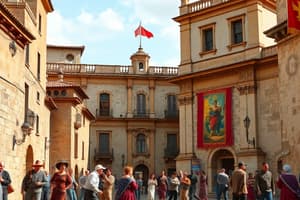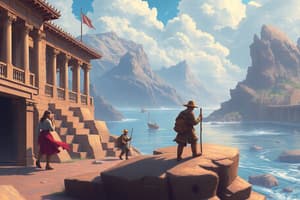Podcast
Questions and Answers
Which of the following is NOT a major provision of the Treaty of Versailles?
Which of the following is NOT a major provision of the Treaty of Versailles?
- Germany's obligation to pay reparations
- Germany's loss of territory
- Germany's limitations on its military
- Germany's admission into the League of Nations (correct)
What concept refers to the spread of a disease?
What concept refers to the spread of a disease?
- Bias
- Cholera (correct)
- Alliance
- Colony
What is the term used to describe a source's trustworthiness or reliability?
What is the term used to describe a source's trustworthiness or reliability?
Credible Source/Reliability
Which of the following is an example of an absolute monarchy?
Which of the following is an example of an absolute monarchy?
What document affirmed the basic rights of all men?
What document affirmed the basic rights of all men?
The "Divine Right of Kings" theory supports the idea that monarchs derive their power from God.
The "Divine Right of Kings" theory supports the idea that monarchs derive their power from God.
Which theory posits that the Earth is the center of the universe and that all celestial bodies revolve around it?
Which theory posits that the Earth is the center of the universe and that all celestial bodies revolve around it?
The term "Imperialism" refers to the policy of expanding a country's power and influence through colonization and domination.
The term "Imperialism" refers to the policy of expanding a country's power and influence through colonization and domination.
What is the name of the group that opposed the British rule in India?
What is the name of the group that opposed the British rule in India?
Who led the Boxer Rebellion, a Chinese nationalist movement against foreign influence?
Who led the Boxer Rebellion, a Chinese nationalist movement against foreign influence?
What theory explains the origins and development of societies through competition and the survival of the fittest?
What theory explains the origins and development of societies through competition and the survival of the fittest?
The "Sphere of Influence" refers to a region where a country exerts control over its political, economic, or military affairs.
The "Sphere of Influence" refers to a region where a country exerts control over its political, economic, or military affairs.
What is a written argument or a reasoned discourse that presents a particular viewpoint and supports it with evidence?
What is a written argument or a reasoned discourse that presents a particular viewpoint and supports it with evidence?
Which of the following statements accurately describes a social contract?
Which of the following statements accurately describes a social contract?
Who is credited with advocating for the "separation of powers" in government, dividing power among different branches to prevent tyranny?
Who is credited with advocating for the "separation of powers" in government, dividing power among different branches to prevent tyranny?
Who is famous for writing "Leviathan" which argued for a strong sovereign power to maintain order and prevent social chaos?
Who is famous for writing "Leviathan" which argued for a strong sovereign power to maintain order and prevent social chaos?
Which of the following is associated with the Renaissance?
Which of the following is associated with the Renaissance?
Whose ideas greatly influenced the American Revolution and the Declaration of Independence?
Whose ideas greatly influenced the American Revolution and the Declaration of Independence?
Flashcards
Absolute Monarchy
Absolute Monarchy
A form of government where a sole ruler, often a king or queen, holds absolute power, passing laws without any legislative body's approval, and is not bound by any constitution or legal limitations.
Alliances
Alliances
Agreements between two or more nations, often for mutual defense or cooperation, that can involve joint military action or diplomatic support.
Bias
Bias
A perspective or viewpoint that favors one side over another, often influenced by personal beliefs, experiences, or interests, potentially leading to a lack of objectivity.
Cholera
Cholera
Signup and view all the flashcards
Colony
Colony
Signup and view all the flashcards
Constitutional Monarchy
Constitutional Monarchy
Signup and view all the flashcards
Credible Source/Reliability
Credible Source/Reliability
Signup and view all the flashcards
Declaration of the Rights of Man and Citizen
Declaration of the Rights of Man and Citizen
Signup and view all the flashcards
Democracy
Democracy
Signup and view all the flashcards
Divine Right of Kings
Divine Right of Kings
Signup and view all the flashcards
Estate (French Revolution)
Estate (French Revolution)
Signup and view all the flashcards
Geocentric Theory (Model)
Geocentric Theory (Model)
Signup and view all the flashcards
Heliocentric Theory (Model)
Heliocentric Theory (Model)
Signup and view all the flashcards
Imperialism
Imperialism
Signup and view all the flashcards
Labor Unions
Labor Unions
Signup and view all the flashcards
Militarism
Militarism
Signup and view all the flashcards
Nationalism
Nationalism
Signup and view all the flashcards
Natural Rights
Natural Rights
Signup and view all the flashcards
Primary Source
Primary Source
Signup and view all the flashcards
Protectorate
Protectorate
Signup and view all the flashcards
Social Contract
Social Contract
Signup and view all the flashcards
Social Darwinism
Social Darwinism
Signup and view all the flashcards
Sphere of Influence
Sphere of Influence
Signup and view all the flashcards
Thesis
Thesis
Signup and view all the flashcards
Cesare Beccaria
Cesare Beccaria
Signup and view all the flashcards
Simón Bolívar
Simón Bolívar
Signup and view all the flashcards
Napoleon Bonaparte
Napoleon Bonaparte
Signup and view all the flashcards
Nicolaus Copernicus
Nicolaus Copernicus
Signup and view all the flashcards
Galileo Galilei
Galileo Galilei
Signup and view all the flashcards
Thomas Hobbes
Thomas Hobbes
Signup and view all the flashcards
John Locke
John Locke
Signup and view all the flashcards
Emperor Menelik II
Emperor Menelik II
Signup and view all the flashcards
Baron de Montesquieu
Baron de Montesquieu
Signup and view all the flashcards
Sir Isaac Newton
Sir Isaac Newton
Signup and view all the flashcards
Mangal Pandey
Mangal Pandey
Signup and view all the flashcards
Rani Lakshmibai
Rani Lakshmibai
Signup and view all the flashcards
Jean-Jacques Rousseau
Jean-Jacques Rousseau
Signup and view all the flashcards
Adam Smith
Adam Smith
Signup and view all the flashcards
Queen Mother Yaa Asantewaa
Queen Mother Yaa Asantewaa
Signup and view all the flashcards
Gavrilo Princip
Gavrilo Princip
Signup and view all the flashcards
Archduke Franz Ferdinand
Archduke Franz Ferdinand
Signup and view all the flashcards
Study Notes
Political Concepts and Figures
- Absolute Monarchy
- Alliances
- Bias
- Cholera
- Colony
- Constitutional Monarchy
- Credible Source/Reliability
- Declaration of the Rights of Man and Citizen
- Democracy
- Divine Right of Kings
- Estate (French Revolution)
- Geocentric Theory (Model)
- Heliocentric Theory (Model)
- Imperialism
- Labor unions
- Militarism
- Nationalism
- Natural Rights
- Primary Source
- Protectorate
- Social Contract
- Social Darwinism
- Sphere of Influence
- Thesis
Historical Figures
- Cesare Beccaria
- Simón Bolívar
- Napoleon Bonaparte
- Nicolaus Copernicus
- Galileo Galilei
- Thomas Hobbes
- John Locke
- Emperor Menelik II
- Baron de Montesquieu
- Sir Isaac Newton
- Mangal Pandey
- Rani Lakshmibai
- Jean-Jacques Rousseau
- Adam Smith
- Queen Mother Yaa Asantewaa
- Gavrilo Princip
- Archduke Franz Ferdinand
Events and their Analysis
- Analyzing Political Cartoons
- Challenges to traditional ways of thinking
- Protestant Reformation
- Enlightenment/Age of Reason
- Effects of the Enlightenment
- American Revolution
- French Revolution
- Latin American Revolutions
- Citizens
- Causes and Effects of Industrial Revolution
- Why England?
- Effects on all social classes and men/women/children
- Causes and Effects of Imperialism
- Boxer Rebellion
- Napoleonic Code
- White Man's Burden
- Meiji Restoration
- Successes and failures in resisting imperialism.
- MAIN Causes of World War I
- Powder Keg of Europe
- Contributions of colonies during WWI
- Major provisions of the Treaty of Versailles and how it affects Germany
Studying That Suits You
Use AI to generate personalized quizzes and flashcards to suit your learning preferences.




